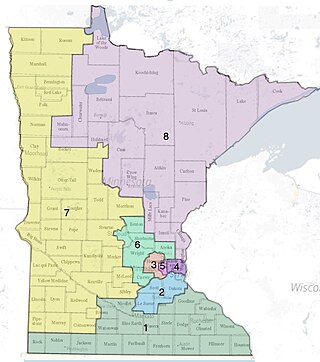Minnesota is currently divided into eight congressional districts, each represented by a member of the United States House of Representatives. After the 2020 census, the number of Minnesota's seats remained unchanged.

Minnesota statutes do not require candidates for the United States House of Representatives to reside in the district in which they run for office, but candidates must be inhabitants of the state at the time of the election.[2][3]
Current districts and representatives edit
List of members of the United States House delegation from Minnesota, their terms, their district boundaries, and the district political ratings according to the CPVI. The delegation has a total of eight members, consisting of four Democrats and four Republicans.
| Current U.S. representatives from Minnesota | |||||
|---|---|---|---|---|---|
| District | Member (Residence)[4] |
Party | Incumbent since | CPVI (2022)[5] |
District map |
| 1st | Brad Finstad (New Ulm) |
Republican | August 12, 2022 | R+7 | |
| 2nd | Angie Craig (Prior Lake) |
Democratic (DFL) | January 3, 2019 | D+1 | |
| 3rd | Dean Phillips (Plymouth) |
Democratic (DFL) | January 3, 2019 | D+8 | |
| 4th | Betty McCollum (Saint Paul) |
Democratic (DFL) | January 3, 2001 | D+17 | |
| 5th | Ilhan Omar (Minneapolis) |
Democratic (DFL) | January 3, 2019 | D+30 | |
| 6th | Tom Emmer (Delano) |
Republican | January 3, 2015 | R+12 | |
| 7th | Michelle Fischbach (Regal) |
Republican | January 3, 2021 | R+19 | |
| 8th | Pete Stauber (Hermantown) |
Republican | January 3, 2019 | R+8 | |
Historical and present district boundaries edit
Table of United States congressional district boundary maps in the State of Minnesota, presented chronologically.[6] All redistricting events that took place in Minnesota between 1973 and 2013 are shown.
| Year | Statewide map | Minneapolis–St. Paul Metro Area highlight |
|---|---|---|
| 1872–1882 | ||
| 1882–1892 | ||
| 1892–1902 | ||
| 1902–1912 | ||
| 1973–1982 | ||
| 1983–1992 | ||
| 1993–1994 | ||
| 1995–2002 | ||
| 2003–2013 | ||
| 2013-2023 | ||
| Since 2023 |
Obsolete districts edit
Districts edit
Congressional districts are also used to ensure regional representation on other government bodies within the state. The following entities are required by state statute to have at least one member from each congressional district:
- The Minnesota Court of Appeals (based on a judge's place of residence for a minimum of one year upon initial appointment or election).[7]
- The Board of Regents of the University of Minnesota.[8]
- The Minnesota State Colleges and Universities System Board of Trustees.[9]
- The state Board of Invention.[10]
Minnesota currently has eight congressional districts. There were 9th and 10th districts but they were eliminated in 1963 and 1933 respectively. Redistricting is done every 10 years to reflect population shifts within the United States.
- 9th district: 1903–1933, 1935–1963 (obsolete since the 1960 census)
- 10th district: 1915–1933 (obsolete since the 1930 census)
See also edit
References edit
- ^ "LCC-GIS" (PDF).
- ^ "204B.06 FILING FOR PRIMARY; AFFIDAVIT OF CANDIDACY". Office of the Revisor of Statutes. 2012. Retrieved November 4, 2012.
- ^ Devin Henry (February 21, 2012). "Bachmann to seek 6th District seat despite redistricting". MinnPost. Retrieved November 4, 2012.
- ^ "Office of the Clerk, U.S. House of Representatives". clerk.house.gov. Retrieved January 6, 2022.
- ^ "2022 Cook PVI: District Map and List". Cook Political Report. Retrieved January 7, 2023.
- ^ "Digital Boundary Definitions of United States Congressional Districts, 1789–2012". Retrieved October 18, 2014.
- ^ "Administrative Order filed in In re Designations of Court of Appeals Judges for Congressional Districts Pursuant to Minnesota Statutes Section 480A.02, Subdivision 5". Minnesota Judicial Branch. January 13, 2012. Retrieved November 4, 2012.
- ^ "137.024 CONGRESSIONAL DISTRICTS REPRESENTED ON BOARD OF REGENTS". Office of the Revisor of Statutes. 2012. Retrieved November 4, 2012.
- ^ "136F.02 BOARD OF TRUSTEES". Office of the Revisor of Statutes. 2012. Retrieved November 4, 2012.
- ^ "116J.988 BOARD OF INVENTION". Office of the Revisor of Statutes. 2012. Retrieved November 4, 2012.
External links edit
- Minnesota congressional districts map, 2013–present Minnesota Legislative Coordinating Commission